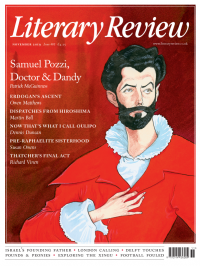Jeremy Lee
Not a Chicken Wing in Sight
My Last Supper: One Meal, a Lifetime in the Making
By Jay Rayner
Guardian Faber 284pp £16.99
Wondering what would be the very last bite you take in this life may well be a chilling exercise. A final meal is more often than not the last thing on the mind of someone in full knowledge of their imminent death. For Jay Rayner, it’s an adventure into which he can sink his well-practised teeth. He embarks on it by considering the curious choices made by some of death row’s more nefarious residents, from a single olive to the inevitable buckets of fried chicken and burgers, ordered from the usual suspects of fast food chains, washed down with diet drinks, as if such a consideration had any worth in the circumstances.
Not for our author, a celebrated restaurant critic, such drab succour, so disappointing and uninteresting considering the infamy of the crimes committed. No, Rayner sets out to make a menu that celebrates his life. He travels down the years to recall his most cherished culinary memories, his mother and dear friends, laughs aplenty and great sadnesses, arriving ultimately at a menu that distils his life into one ultimate dinner.
There is a television play, written by Kazuo Ishiguro, called The Gourmet, starring Charles Gray in one of his last appearances on screen. The protagonist is a gourmet, the very model of an epicure, who has eaten everything and struggles with the weary business of ennui, until he is granted the secret to trapping, preparing, cooking and eating a ghost. The ghost – a very reliable one, as ghosts go – haunts a Hawksmoor church in the East End of London, to which the protagonist goes in search of the ultimate delicacy. Driving away from the scene afterwards, leaving behind him a great pile of paraphernalia (and an unholy mess it is), he mutters from the back of his Rolls-Royce to the chauffeur up front what a brilliant success he has had. But euphoria lasts only a few moments before dreary ennui settles upon him once more. The metaphor is clear.
Readers of Rayner’s book may be forgiven a certain dread of their own while anticipating the choices he makes for his meal. Might it be the same as winning the lottery and suddenly being in possession of untold wealth, with every wish granted, every whim sated? But although he travels through time and space to find the best produce, his choices, delightfully, are not obvious. Shadowing Rayner as he decides on and then sets out in search of all that he wishes for at a final gathering at table with near and dear (vital for a hearty appetite and conviviality), the reader is taken on a journey from London in the 1970s, through his years as a student and columnist, to his becoming a restaurant critic. There is the happy recollection of eating oysters for the first time at the age of ten, having been taken to a restaurant by his mother to be tutored in their joys. There is the search for the best bread. There is, too, the seeking out of butter. The bread is there to accompany Carlingford oysters, as great an oyster as one could wish for, ‘Gulf-esque in their creaminess’. It’s vital too for scooping up the garlic butter from the snails, cooked in the classic form, that also appear on Rayner’s menu, which concludes with a glorious meringue confection. Rayner’s shopping list induces a great sigh of relief. I can happily relax and applaud the choices made.
In among the tales of gathering all the various parts of this last supper are stories and favourite songs, another string to Rayner’s bow being a talent for jazz. Then there is the question of who should cook this last supper. Here, his choice proves peerless. Henry Harris created in London a beautiful little corner of France in his late and much lamented restaurant Racine. The closing of Racine in 2015 I often think of as a foreboding of what was to come, for how could such a lovely restaurant that celebrated and executed the bistro cooking of France so brilliantly not flourish? Although the restaurant closed, Harris rallied and carried on cooking. Suffice it to say that after a life spent eating and cooking French food and years as Simon Hopkinson’s head chef at Hilaire and then Bibendum, which produced cuisine bonne femme magnificently, Harris would do Rayner proud.
A last supper is by its very nature an indulgent thought. Frankly, most folk would rather not turn their minds to it. Should one ever be faced with such a prospect, a celebration of one’s life is surely what it should be.

Sign Up to our newsletter
Receive free articles, highlights from the archive, news, details of prizes, and much more.@Lit_Review
Follow Literary Review on Twitter
Twitter Feed
The era of dollar dominance might be coming to an end. But if not the dollar, which currency will be the backbone of the global economic system?
@HowardJDavies weighs up the alternatives.
Howard Davies - Greenbacks Down, First Editions Up
Howard Davies: Greenbacks Down, First Editions Up - Our Dollar, Your Problem: An Insider’s View of Seven Turbulent...
literaryreview.co.uk
Johannes Gutenberg cut corners at every turn when putting together his bible. How, then, did his creation achieve such renown?
@JosephHone_ investigates.
Joseph Hone - Start the Presses!
Joseph Hone: Start the Presses! - Johannes Gutenberg: A Biography in Books by Eric Marshall White
literaryreview.co.uk
Convinced of her own brilliance, Gertrude Stein wished to be ‘as popular as Gilbert and Sullivan’ and laboured tirelessly to ensure that her celebrity would outlive her.
@sophieolive examines the real Stein.
Sophie Oliver - The Once & Future Genius
Sophie Oliver: The Once & Future Genius - Gertrude Stein: An Afterlife by Francesca Wade
literaryreview.co.uk